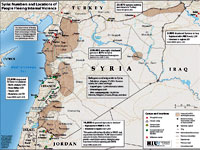Western military intervention in Syria highly likely – Russian experts

(Interfax – August 27, 2013) The likelihood of Western military intervention in Syria is very high, Sergey Karaganov, honorary chairman of the presidium of the Council on Foreign and Defense Policy (SVOP) think-tank, has said.
“Unfortunately, the concentration of troops in the region is such that a war may start. The USA may strike within the next two months, even despite the fact that President Barack Obama is not very interested in this war,” privately-owned Russian news agency Interfax quoted Karaganov as saying on 27 August.
“Nevertheless, he (Obama) is facing triple pressure. First, from his supporters, second, from the Republicans who want to drag him into another war, thereby destroying him politically. Europeans are also exerting pressure on him. They need a small victorious war, waged by the USA, to distract the population’s attention from domestic economic problems,” Karaganov said.
“In the first place, palaces and military installations will be hit. They are located in cities. Therefore, of course civilians will suffer. And the winner of this war may be Islamists or Al-Qa’idah. The scenario may be more frightening than the one we saw in Libya,” Karaganov continued. He also expressed the doubt that Syrian President Bashar al-Asad had ordered to use chemical weapons. “This is disadvantageous for Al-Asad himself in the first place. The effectiveness of such weapons is not high, while political costs are significant,” Karaganov said.
The chairman of the SVOP presidium, Fedor Lukyanov, told Interfax the same day that the United States might use statements by UN inspectors on the use of chemical weapons in Syria as a formal pretext to launch a military operation against Damascus. “This (intervention) should happen quickly. I think that the formal dividing line will be words, statements made by the UN inspection mission, who, according to their mandate, cannot and will not draw conclusions on who is responsible for what happened,” Lukyanov said. “The inspectors will say that there are grounds to believe that chemical weapons were used… No direct evidence could be found, but there is a large amount of indirect evidence,” he predicted.
Lukyanov suggested that Iran would also get involved in the possible conflict. “Iran will support this regime to the end. Therefore, I can imagine that Iran will use its capabilities, not military ones but its influence on some extremist organizations, in order to retaliate against the United States, not militarily but by stepping up terrorist activities,” he said.
He said that an all-out invasion was unlikely. “Most likely, there will be something similar to Yugoslavia, that is to say, an air campaign, strikes against key targets from aircraft carriers or aircraft, adjusted for the fact that there are some serious risks. After all, the Syrian armed forces are considered quite a serious opponent, especially with regard to air defences,” Lukyanov added.
Later the same day, Russian state news agency RIA Novosti quoted Lukyanov as predicting that Syria would be the main topic of discussion during Russian President Vladimir Putin’s meeting with US President Barack Obama at the G20 summit in St Petersburg. “If in the next week or two the United States decide to attack Syria, it is clear that the G20 summit will take place in the shadow of this event, and everyone will have to discuss it… If the meeting (between Obama and Putin) takes place against the background of bombings of Damascus, of course the conversation will be extremely tough and short, and I think it will produce nothing. If there is no invasion, the conversation will be short and not so tough, and will also produce nothing… Relations between Putin and Obama are poor, cold, so to speak,” Lukyanov said.
Another pundit, the editor in chief of Mezhdunarodnaya Zhizn (International Life) magazine, Armen Oganesyan, told RIA Novosti that Obama had agreed to meet Putin at the G20 summit because of the situation in Syria and Egypt. “Obama is afraid that if Russia is excluded from the high-level negotiating process and if he does not at least inform Moscow of his plans, this will lead to a deadlock in Russian-American relations,” Oganesyan said. He also suggested that both Washington and London were increasingly aware that they should coordinate their plans regarding the Middle East with Moscow.
Meanwhile, Anatoliy Sitnov, former Chief of Armaments of the Russian Armed Forces, said that the Syrian army would be a formidable opponent for the West. “Syria is not Libya, and if the United States and NATO unleash another aggression against the Syrian people, they will have to fight with the army that has extensive military experience on the ground and in the air,” corporate-owned Russian military news agency Interfax-AVN quoted Sitnov as saying.
The Syrian armed forces have “the (Russian-made) surface-to-air missile systems Buk-M2E, Tor-M2E, Osa, Krug, and something else that the Americans will learn only when they venture to go to war with Syria,” Sitnov added.
